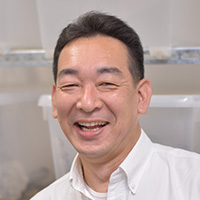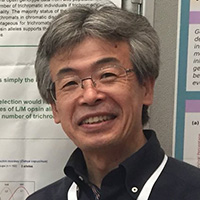Message from the Head
Sachihiro Matsunaga
Head, Department of Integrated Biosciences

Head, Department of Integrated Biosciences
Department of Integrated Biosciences is a globally unique department that emphasizes diversity and pursues life science research with a free and creative mindset. When you look out over the vast field of research, you will see countless structures built from blocks of research achievements. Some may already be towering, solid skyscrapers, while others might appear as mere foundations of stone, easily overlooked. However, we must remember that the current appearance of these structures does not guarantee their future. Even if it appears to be an impressive skyscraper, it might not be possible to build it any taller with the current construction technology. Conversely, a seemingly humble foundation could rapidly grow into a magnificent building.
As a collective dedicated to pioneering new research domains, we aim to build new structures on this expansive research field together with you. The experience of taking on new challenges during your graduate studies will undoubtedly fuel you as you journey through life. During your time in the Department of Integrated Biosciences, you will fully embrace the spectrum of experiences—success and failure, joy and sorrow, fulfillment and loss. Through these lived experiences, you will have the opportunity to rediscover yourself, asking questions like, “What am I truly suited for?” and “How should I navigate my life?”
Our department provides a research and educational environment where you can immerse yourself in your studies and embark on this journey of self-discovery. So, let us begin this journey together here.
"You’re the only one who can make the difference. Whatever your dream is, go for it. Because you were born to be happy." – Magic Johnson
Messages from Ex-heads
Shinji Nagata
Head, Department of Integrated Biosciences (2023-2024)

Head, Department of Integrated Biosciences (2023-2024)
We can see various living things around us.
Only human beings can pursue the principles of life. Elucidation of the principle of life is a significant issue for us to live together with various living things on the earth.
Although pursuing this issue is a "Life Science" goal, it would be challenging to continue researches under the force of this mission.
Only human beings can pursue the principles of life. Elucidation of the principle of life is a significant issue for us to live together with various living things on the earth.
Although pursuing this issue is a "Life Science" goal, it would be challenging to continue researches under the force of this mission.
A convenient and conventional way to keep running researches is just to conduct our "curiosity." "What is going on?/ What happened?" These questions motivate us to drive the goal of our researches. Finally, in a far ahead of our researches, we are hopeful that there would be an elucidation of "the principle of life."
There are many exciting and intriguing phenomena around us on the earth. The more we know, the more we want to know. The more we know, the more interested we become. It is likely a loop of exploding "Curiosity."
The Department of Integrated Biosciences is a unique department that deals with extensively various organisms for research. I myself have been a member of this department for a long time and have been excited by the diversity of organisms and their biological events dealing as research subjects.
No one knows how much our researches contribute to the elucidation of the principles of life. Of course, we understand that our research needs to catch up to complete elucidation. When we encounter such a gigantic and mysterious opponent, we may cower and obey its power. However, we can sometimes see brave people confronting such a considerable opponent. That is the scientist.
We scientists continuously acquire some tiny discoveries, sometimes great discoveries.
It is a pleasure to witness the moment of such discoveries and share this with our colleagues.
It is a pleasure to witness the moment of such discoveries and share this with our colleagues.
It would be better to have many colleagues to fight in the vanguard. We can share joys and hard times during our endeavors.
We are looking for such colleagues who aspire to be researchers. Moreover, we want to enjoy their growth throughout the practical scientific fields.
We are looking for such colleagues who aspire to be researchers. Moreover, we want to enjoy their growth throughout the practical scientific fields.
We want to grow together for the life science in the Department of Integrated Biosciences.
Shoji Kawamura
Head, Department of Integrated Biosciences (2022)
Head, Department of Integrated Biosciences (2022)

This is the meaning of the Japanese motto for this department. You will accomplish this not through approaching an existing branch of a research field, but by making your research unique. You will create new frontiers of your own research field, which others will join and follow. In this way, your small field will grow. Come and create new research with us.
Integrated Bioscience, the English name of this department, represents our approach to creating this new frontier. We innovate not just by using familiar research methods and skills, but by incorporating various new methodologies and ways of thinking. This department was established about 20 years ago at the Kashiwa New Campus with faculty members from several graduate schools from the traditional Hongo Campus spanning various scientific disciplines (agricultural, pharmaceutical, engineering, zoological, botanical, anthropological sciences), as well as various majors and courses in these schools. In our department, there are laboratories with far-reaching interests such as food, health, bioresources, diversity and evolution. We pursue the principle of life by integrating various disciplines and “Innovative and Transdisciplinary Research".
If Hongo Campus is characterized as tradition, and Komaba Campus as education, Kashiwa Campus is "creation".
As a student in this department, you will increase your motivation to take on challenges while experiencing hands-on research activities. You will train yourself to think logically based on evidence, make yourself understood, and face questions, and also make internationalization part of your daily life. I would like you to acquire a "researcher mindset" through this training. This department aims not only to nurture scientists, but also to send competent people, who have acquired a “researcher mindset”, to societies at large.



